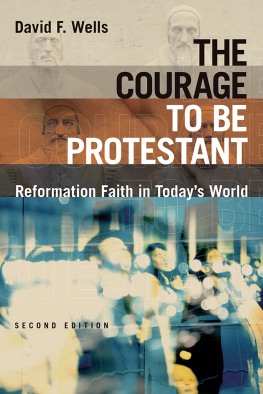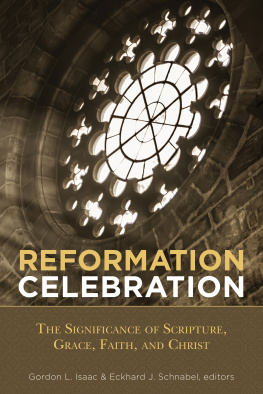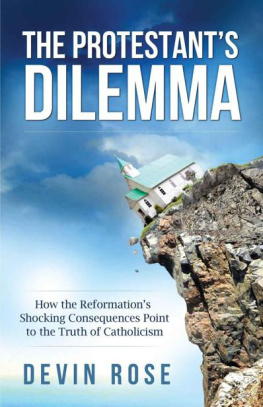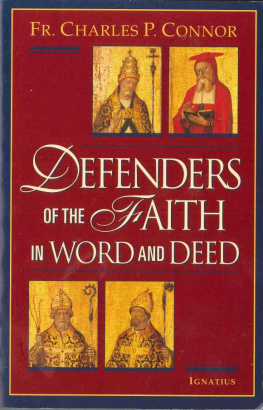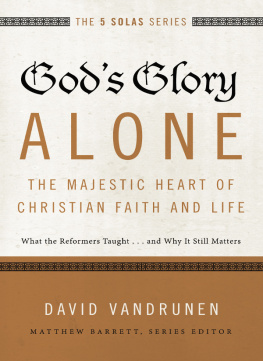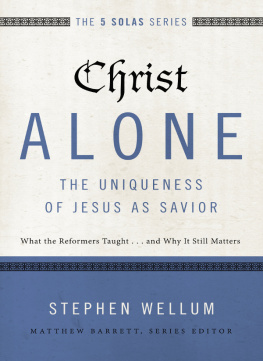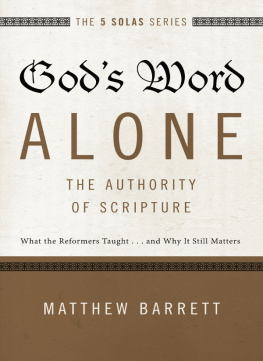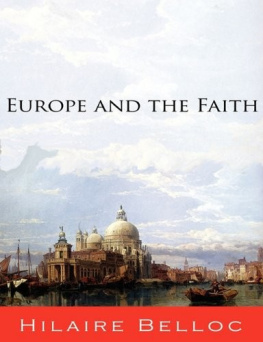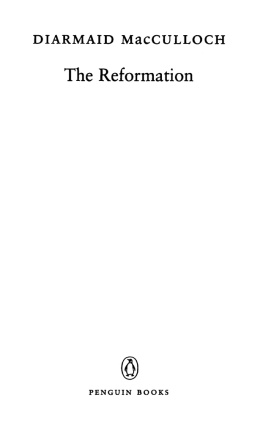The Courage to Be Protestant
Reformation Faith in Todays World
SECOND EDITION
David F. Wells
WILLIAM B. EERDMANS PUBLISHING COMPANY
GRAND RAPIDS, MICHIGAN
Wm. B. Eerdmans Publishing Co.
2140 Oak Industrial Drive N.E., Grand Rapids, Michigan 49505
www.eerdmans.com
2008, 2017 David F. Wells
All rights reserved
First edition 2008
Second edition 2017
23 22 21 20 19 18 171 2 3 4 5 6 7
ISBN 978-0-8028-7524-2
eISBN 978-1-4674-4717-1
Library of Congress Cataloging-in-Publication Data
A catalog record for this book is available from the Library of Congress
To
the staff of Rafiki
who care for orphans in Africa with
such skill, compassion, and Christian dedication
Contents


T his book is now starting its second life. Its first life began in 2008. What I set out to do then was to provide a summary of four books I had previously written. They were, first, No Place for Truth; or, Whatever Happened to Evangelical Theology? (1993). This was followed by three others that explored different aspects of the same terrain. They were God in the Wasteland: The Reality of Truth in a World of Fading Dreams (1994), Losing Our Virtue: Why the Church Must Recover Its Moral Vision (1998), and Above All Earthly Powrs: Christ in a Postmodern World (2005). However, I wanted to make the substance of these earlier volumes more accessible and therefore to bring them to a wider audience. So, I compressed 1,100 pages into 250 and simplified what had been said earlier.
This task required that I recast as well as summarize the earlier work, updating it along the way. I organized it around five central themes: truth, God, self, Christ, and the church. Since this book, The Courage to Be Protestant, is a summary, I did not document the literature and research upon which it rested; that had already been done in the previous volumes. It therefore had no footnotes.
Books begin, Winston Churchill said, as an adventure, turn into a toy, then an amusement, then a mistress, then a master, and finally a tyrant. But just before you are about to bend and crack, you decide instead to declare your independence by killing the monster. It gets sent off to the publisher! So it was here.
In 2016, though, and quite unexpectedly, I was approached by Eerdmans to see if I would be willing to give the book a second life. I was asked to edit and update it but with 2017 in view, the 500th anniversary of the Protestant Reformation. This was not a particularly difficult task. When writing the earlier books, as well as their summary in The Courage to Be Protestant, I had always been thinking within a framework of Reformational thought. I simply had not made these connections too explicitly. Now, in this new edition, the connections are made.
In this, its second life, there are some other changes. One entire chapter has been eliminated and half of another. At the same time, some fresh material has been added. Why make these changes?
In the original edition of The Courage to Be Protestant, I drew a map of the evangelical world and made the argument that evangelicalism was made up of three large constituencies. Two of thesethe church marketers and the emergentswere relatively new and, as I saw it, they were transitional movements. I added that with their blas attitude toward the biblical doctrinewhat had been at the heart of the earlier, more classical form of evangelicalismthey were moving, however unwittingly, toward a more liberalized Christianity.
Much has happened since I wrote these words even though this was less than a decade ago. The emergents have evaporated and their incipient liberalism has come out into the open. The marketers have morphed into the attractional church. Attitudes have changed, too. A little chastening has set in about the earlier and more brazen attempts at marketing Christian faith. Not only so, but the cultural environment has changed, too. It is becoming rather more hostile to traditional Protestant belief. So, with all of this in mind, I decided to eliminate the earlier focus on marketers and emergents. I have still given space to them, but all I have tried to do here is to put them in their recent, historical context.
We are now on the cusp of many changes, in our world and in evangelical faith, and we need to be looking ahead. But, in this book, I am also looking behind and keeping in mind what happened in the Reformation. The aim is to make at least a few connections between then and now.
Eerdmans, who published all of these volumes, has been a most helpful, proficient, and competent publisher. I wish to express my sincere gratitude to them and not least, for their kind invitation to produce this present book.

Humpty Dumpty sat on a wall.
Humpty Dumpty had a great fall.
All the kings horses and all the kings men
Couldnt put Humpty together again.
E vangelicalism has struck an iceberg just as the Titanic did a century ago. This is an outcome as unexpected now as it was back then. Then, the Titanic seemed unsinkable. Indeed, that boast was made publicly. After all, it had the latest technology and its sheer size, it seemed, made it impervious to the perils of the sea. That turned out to be quite mistaken. This is where the parallel to the contemporary evangelical world lies. Perception now, as then, has parted company with reality.
Today, though, the appearance is one of great success in evangelicalism. Have not believers multiplied, educational institutions matured, organizations increased, religious fare on the Internet multiplied, and presses found their niches? Not only so, but is it not the case that many churches, at least in the United States, have also become inventive? They are throwing off the restraints of having to be stodgy and traditional. In a burst of creativity, and flush with this new freedom from the past, some churches now feature coffee at worship and many have rock musicians on the stage who could perform with the best of them. In an increasing number of churches, gone are the old pews, the crosses, the pulpit, and the obligatory collection. Actually, for others, gone is the church itself.
Why? Well, why not think of the local church as just a starter institution? Is it not really like a school from which those who are mature graduate? That is, let us think of it as a place to start out but not to stay in. That is what some are now saying. Therefore, instead of trekking each Sunday to a church building, why not have a floating and informal fellowship in its place, one that is virtual? Why not attend worship elsewhere, maybe on the other side of the country, online, where there is not only a choice of preachers but where one can hear those who can really preach? Is not doing church in these new ways what will appeal to the younger generations? For far too long, the church has lagged behind, it has been hidebound, and it has labored on the brink of irrelevance. It is always playing catch-up. No longer!
The leading edge on all of these experiments is, in fact, intent on becoming more current than current. The movers behind these changes are not only tech-savvy but acutely sensitive to every twitch in culture, every shadow, every mood, every abrupt turn. No sooner does it happen than they are on it and, in the twinkling of an eye, the church has twitched itself into a slightly new pattern. Then harmony is restored.

